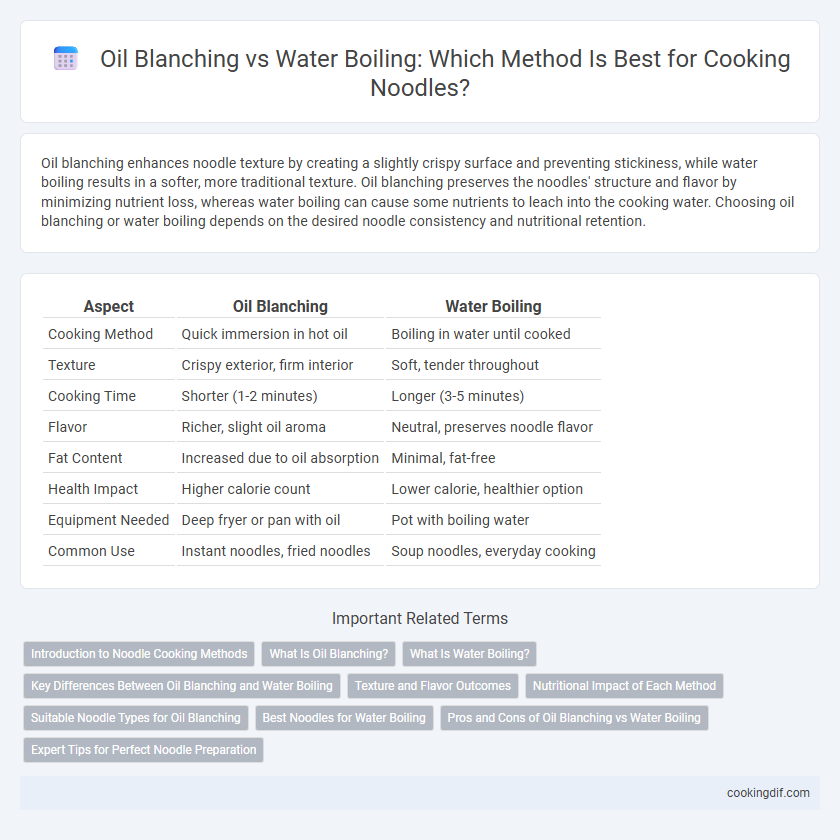Oil blanching enhances noodle texture by creating a slightly crispy surface and preventing stickiness, while water boiling results in a softer, more traditional texture. Oil blanching preserves the noodles' structure and flavor by minimizing nutrient loss, whereas water boiling can cause some nutrients to leach into the cooking water. Choosing oil blanching or water boiling depends on the desired noodle consistency and nutritional retention.
Table of Comparison
| Aspect | Oil Blanching | Water Boiling |
|---|---|---|
| Cooking Method | Quick immersion in hot oil | Boiling in water until cooked |
| Texture | Crispy exterior, firm interior | Soft, tender throughout |
| Cooking Time | Shorter (1-2 minutes) | Longer (3-5 minutes) |
| Flavor | Richer, slight oil aroma | Neutral, preserves noodle flavor |
| Fat Content | Increased due to oil absorption | Minimal, fat-free |
| Health Impact | Higher calorie count | Lower calorie, healthier option |
| Equipment Needed | Deep fryer or pan with oil | Pot with boiling water |
| Common Use | Instant noodles, fried noodles | Soup noodles, everyday cooking |
Introduction to Noodle Cooking Methods
Oil blanching preserves noodle texture by creating a thin protective layer that prevents stickiness during cooking, resulting in firmer and less soggy noodles. Water boiling, the traditional method, relies on high-temperature immersion that softens noodles evenly but can lead to nutrient leaching and increased starch release. Selecting between oil blanching and water boiling depends on desired noodle texture, cooking time, and nutritional retention.
What Is Oil Blanching?
Oil blanching is a cooking technique where noodles are briefly immersed in hot oil to partially cook and firm their texture before final preparation. This method reduces water absorption, resulting in noodles that maintain a firmer bite and better shape compared to water boiling. Oil blanching is preferred in industrial noodle production for enhancing texture and preventing noodles from sticking together during packaging.
What Is Water Boiling?
Water boiling for noodle cooking involves immersing noodles in vigorously boiling water until they reach the desired texture, typically between 2 to 5 minutes depending on noodle type. This method preserves the noodle's natural flavor and texture while ensuring even heat distribution for consistent cooking. Unlike oil blanching, water boiling reduces added fats and is widely favored for healthier meal preparation and easier digestion.
Key Differences Between Oil Blanching and Water Boiling
Oil blanching preserves noodle texture by creating a light, protective coating that prevents stickiness, whereas water boiling softens noodles uniformly but can cause them to clump if not stirred properly. Oil blanching typically requires less cooking time and enhances flavor through slight frying, contrasting with water boiling's neutral taste impact. The choice between methods impacts noodle firmness, cooking efficiency, and final dish characteristics, making oil blanching ideal for stir-fried noodles while water boiling suits soups and broths.
Texture and Flavor Outcomes
Oil blanching noodles creates a firmer and less sticky texture while enhancing the surface gloss, resulting in a richer mouthfeel and intensified flavor retention. Water boiling produces softer, more hydrated noodles that absorb seasoning more readily but can become mushy if overcooked, with a milder taste profile. Choosing oil blanching optimizes noodle texture and flavor depth, ideal for stir-fry and dry noodle dishes.
Nutritional Impact of Each Method
Oil blanching preserves more water-soluble vitamins such as B complex and C compared to water boiling, which leaches these nutrients into the cooking water. The presence of oil helps maintain the noodle's texture and enhances the absorption of fat-soluble vitamins like A, D, E, and K. Water boiling may reduce caloric content due to nutrient loss, but it also diminishes essential micronutrients, impacting overall nutritional value.
Suitable Noodle Types for Oil Blanching
Oil blanching is particularly suitable for fresh and egg noodles, as it helps maintain their elasticity and prevents stickiness by creating a light coating of oil. This method enhances the texture and flavor of delicate wheat-based noodles without diluting the taste, unlike water boiling which may cause nutrient loss. Thick, chewy noodles like udon benefit from oil blanching's ability to retain firmness and reduce cooking time.
Best Noodles for Water Boiling
Water boiling is the best cooking method for fresh noodles like ramen, udon, and soba, ensuring they achieve optimal texture and flavor. Unlike oil blanching, which can leave noodles greasy and affect taste, boiling preserves the noodle's natural elasticity and softness. High-quality wheat-based noodles respond well to water boiling, delivering a tender bite and enhanced taste experience.
Pros and Cons of Oil Blanching vs Water Boiling
Oil blanching preserves noodle texture by preventing starch gelatinization, resulting in a firmer, less sticky product, but introduces additional fat content and requires careful temperature control to avoid oil absorption. Water boiling is a traditional method that ensures thorough cooking with low fat, yet it may cause noodles to swell and stick together due to starch leaching, leading to a softer texture. Oil blanching offers better control over noodle texture and shelf life, while water boiling remains cost-effective and simple but risks compromised noodle integrity and shorter shelf stability.
Expert Tips for Perfect Noodle Preparation
Oil blanching enhances noodle texture by preventing stickiness and maintaining firmness, making it ideal for stir-fry dishes. Water boiling efficiently cooks noodles evenly, but may cause them to clump without proper stirring or oil addition. Experts recommend using oil blanching for specialty noodles and precise texture control, while water boiling suits everyday noodle cooking for consistent softness.
Oil blanching vs water boiling for noodle cooking Infographic

 cookingdif.com
cookingdif.com